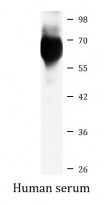ARG42938
anti-Complement Factor I antibody
anti-Complement Factor I antibody for Western blot and Human,Mouse
Overview
| Product Description | Rabbit Polyclonal antibody recognizes Complement Factor I |
|---|---|
| Tested Reactivity | Hu, Ms |
| Tested Application | WB |
| Host | Rabbit |
| Clonality | Polyclonal |
| Isotype | IgG |
| Target Name | Complement Factor I |
| Antigen Species | Human |
| Immunogen | Recombinant fusion protein corresponding to aa. 19-300 of Human Complement Factor I (NP_000195.2). |
| Conjugation | Un-conjugated |
| Alternate Names | Complement factor I; KAF; C3B/C4B inactivator; C3b-INA; ARMD13; EC 3.4.21.45; FI; AHUS3; C3BINA; IF |
Application Instructions
| Application Suggestion |
|
||||
|---|---|---|---|---|---|
| Application Note | * The dilutions indicate recommended starting dilutions and the optimal dilutions or concentrations should be determined by the scientist. | ||||
| Positive Control | Human serum extracts | ||||
| Observed Size | ~ 65 kDa |
Properties
| Form | Liquid |
|---|---|
| Purification | Affinity purified. |
| Buffer | PBS (pH 7.3), 0.02% Sodium azide and 50% Glycerol. |
| Preservative | 0.02% Sodium azide |
| Stabilizer | 50% Glycerol |
| Storage Instruction | For continuous use, store undiluted antibody at 2-8°C for up to a week. For long-term storage, aliquot and store at -20°C. Storage in frost free freezers is not recommended. Avoid repeated freeze/thaw cycles. Suggest spin the vial prior to opening. The antibody solution should be gently mixed before use. |
| Note | For laboratory research only, not for drug, diagnostic or other use. |
Bioinformation
| Database Links | |
|---|---|
| Gene Symbol | CFI |
| Gene Full Name | complement factor I |
| Background | This gene encodes a serine proteinase that is essential for regulating the complement cascade. The encoded preproprotein is cleaved to produce both heavy and light chains, which are linked by disulfide bonds to form a heterodimeric glycoprotein. This heterodimer can cleave and inactivate the complement components C4b and C3b, and it prevents the assembly of the C3 and C5 convertase enzymes. Defects in this gene cause complement factor I deficiency, an autosomal recessive disease associated with a susceptibility to pyogenic infections. Mutations in this gene have been associated with a predisposition to atypical hemolytic uremic syndrome, a disease characterized by acute renal failure, microangiopathic hemolytic anemia and thrombocytopenia. Primary glomerulonephritis with immune deposits and age-related macular degeneration are other conditions associated with mutations of this gene. [provided by RefSeq, Dec 2015] |
| Function | Trypsin-like serine protease that plays an essential role in regulating the immune response by controlling all complement pathways. Inhibits these pathways by cleaving three peptide bonds in the alpha-chain of C3b and two bonds in the alpha-chain of C4b thereby inactivating these proteins (PubMed:7360115, PubMed:17320177). Essential cofactors for these reactions include factor H and C4BP in the fluid phase and membrane cofactor protein/CD46 and CR1 on cell surfaces (PubMed:2141838, PubMed:9605165, PubMed:12055245). The presence of these cofactors on healthy cells allows degradation of deposited C3b by CFI in order to prevent undesired complement activation, while in apoptotic cells or microbes, the absence of such cofactors leads to C3b-mediated complement activation and subsequent opsonization (PubMed:28671664). [UniProt] |
| Cellular Localization | Secreted, extracellular space. [UniProt] |
| Calculated MW | 66 kDa |
Images (1) Click the Picture to Zoom In






